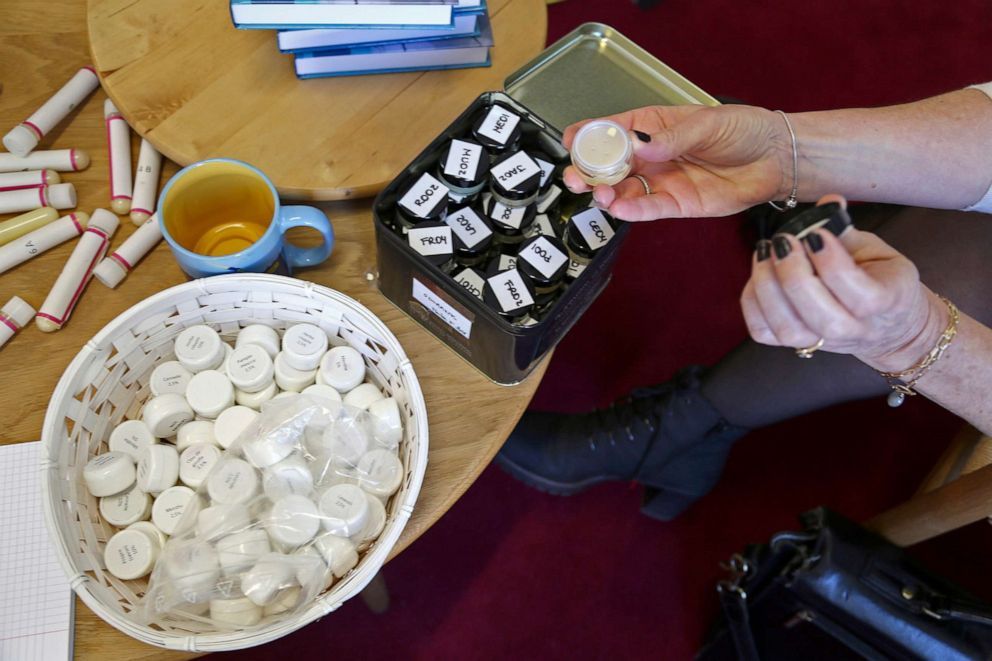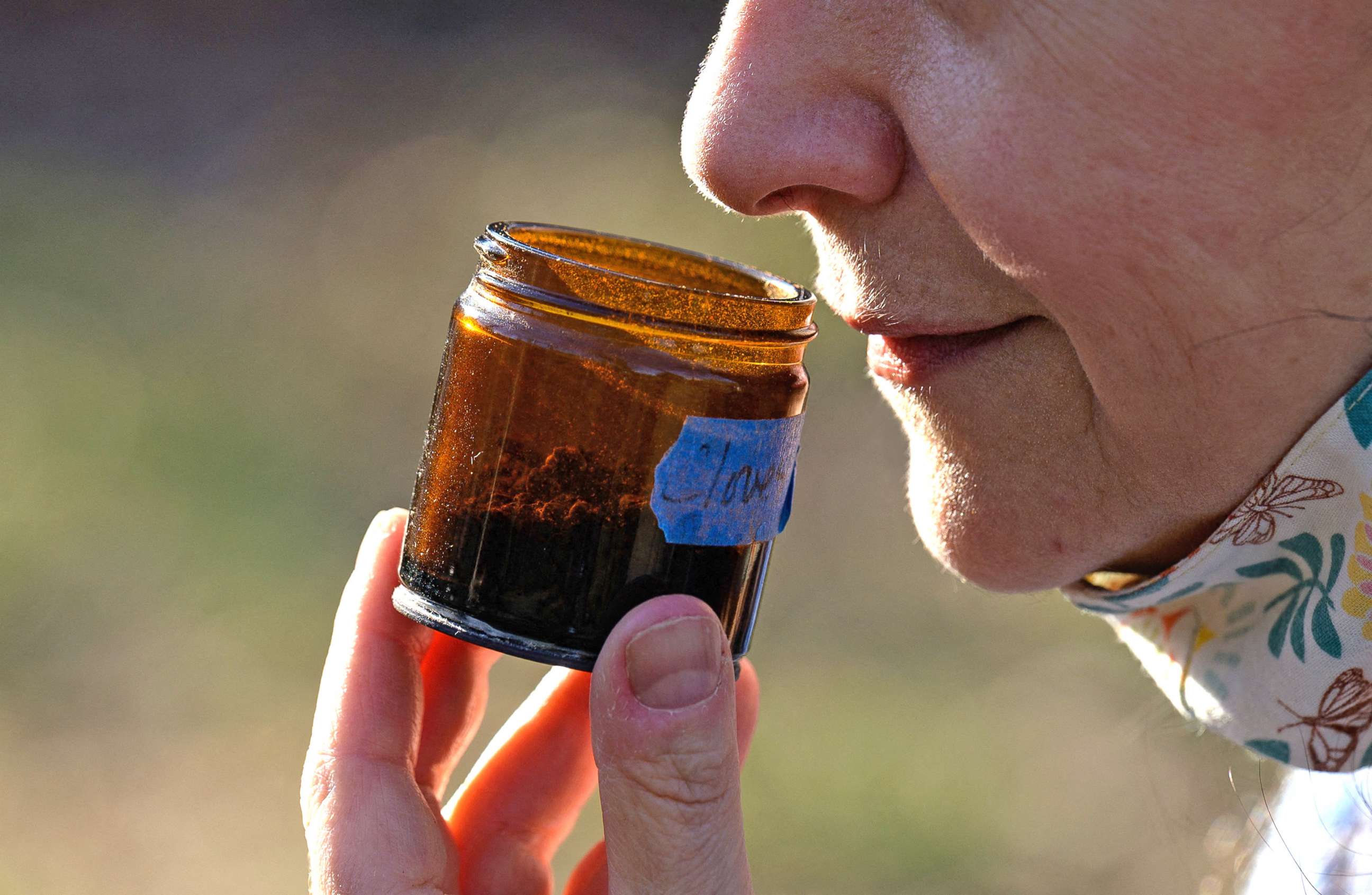How does COVID-19 cause people to lose sense of smell? And how many regain it?
Some studies suggest up to 96% of COVID patients are affected.
Since the start of the COVID-19 pandemic, perhaps no symptom has been in the spotlight more than loss of smell.
Estimates vary, but it's believed that as many as 96% of COVID-19 patients experience some or total loss -- but it's usually temporary. Most regain the sensation within weeks.
Studies have suggested that anosmia, the medical term of the condition, is a better predictor of whether someone has the virus than other symptoms such as cough or fever.
Researchers still don't fully understand how the virus causes loss of smell, but there are a few theories.
"COVID is a brand new virus, so we don't have all the answers yet," Dr. Raj Sindwani, an otolaryngologist at the Cleveland Clinic, told ABC News. "Some time, we might know. But, right now, we really don't know. These are our best guesses."

Types of smell loss
There are two types of loss of smell that people experience from COVID-19: acute and chronic.
Acute is when a person is infected with COVID and may be experiencing other symptoms, such as a runny or stuffy nose, which inflame nasal passages.
"The particles you're supposed to smell have to go through your nose and go to the roof of the nose, where the nerve endings are," Sindwani explained. "If the lining is swollen and you have excess mucus production, obviously those particles aren't going to make it up your nose as well."
A chronic loss of smell happens after a COVID-19 infection has cleared, but, weeks or months later, a person still hasn't regained the sense.
"There's some point of inflammation to the nerve, damage to the nerve, whatever that virus did while it was active and damaged those nerve endings," Sindwani said.
What are the theories?
One theory is that genetics play a role. A study published Wednesday in the journal Nature Genetics found a COVID-19 patient with a locus, or a specific place of a gene on a chromosome, near two olfactory (sense of smell) genes was linked to anosmia.
However, this genetic risk factor only increased the odds of losing sense of smell by 11%, meaning some people who had the genes didn't lose their sense of smell, and vice versa.
"It suggests that genetics contributes to the risk, but doesn't suggest that it is the cause of smell loss, and, if anything, suggests that it's a small contributor," Dr. Justin Turner, an associate professor of otolaryngology-head and neck surgery at Vanderbilt University Medical Center who was not involved in the study, told ABC News. "Because there's many people in this study who have this genetic variability who didn't lose their sense of smell."
Another theory, according to a Harvard Medical School study published in July 2020, is that COVID-19 causes damage to certain cells, called sustentacular cells, that support and assist the olfactory neurons, which identify smells.
Dr. Sandeep Datta, associate professor of neurobiology in the Blavatnik Institute at Harvard Medical School and senior author of the study, said that when sustentacular cells are damaged, they are capable of regenerating and regaining their function.
However, it can take weeks or months, which may explain why many people don't recover their sense of smell for several months.
"That's the theory for which there is the most evidence currently," he told ABC News.
In addition, a National Institutes of Health study from December 2020 suggested loss of smell may be from COVID-19 causing inflammation and bleeding in the part of the brain -- known as olfactory bulbs -- that controls sense of smell.
"It's not clear whether the virus enters into the olfactory bulbs or not -- that's still a question -- but many other viruses do," Dr. Richard Doty, a professor in the department of otorhinolaryngology-head and neck surgery at the University of Pennsylvania, told ABC News. "Even the herpes virus can get into the brain through the olfactory pathway, so it's not beyond a possibility. But the jury's still out on whether the olfactory bulbs play a role" in loss of smell.
Sindwani said it's very possible all of these theories could be true.
"Maybe it's not one or the other, but it's many things -- what we call multifactorial," he said. "Maybe in one patient it's genetic, maybe in another it's the sustentacular cells. Maybe the sustentacular cells could be a reason why the gene isn't letting the smell be regained."

How can COVID patients get back their sense of smell?
Sindwani said it's very rare for COVID-19 patients to not regain their sense of smell. Studies suggest only about 5% of patients still experience anosmia after six months.
There are a couple of things that can be done to try to regain this sense. Medical treatments include using saline flushes to drain out mucus and prescription steroid sprays to decrease inflammation.
Patients also can undergo olfactory training, meaning training the nose to recognize smells again.
Just like there are primary colors -- red, yellow and blue -- there are primary smells: flowery, fruity, aromatic and resinous, Sindwani explained.
"You get sticks, put it under your nose, inhale for 15 to 20 seconds twice a day, and think about what, for example, roses smell like and try to remember," he said. "The thought is that combining visual imagery with the scents of those smell particles can jumpstart to get it to work."
Turner said he believes that stories about anosmia have brought a newfound appreciation for sense of smell to the general public.
"We typically underappreciated this sense because we may not appreciate that we're using it as much in our daily function," he said. "It's not until it's lost that we recognize how important it is."




